Industry 4.0 for businesses and the state: leaders sharing experience at Trans4mation Forum – First Industry 4.0 Forum in Eastern Europe
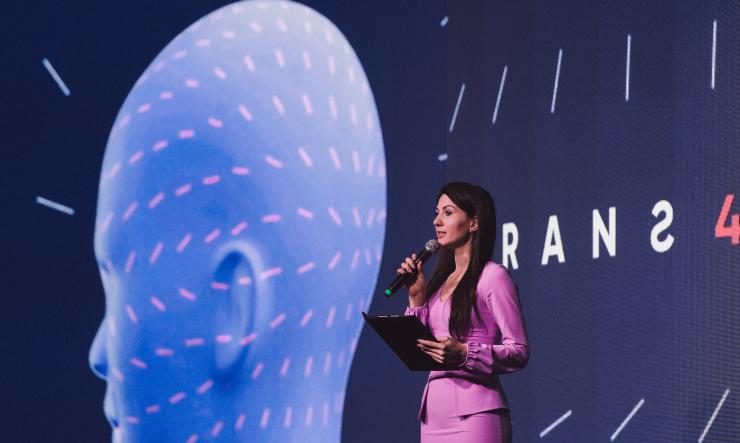
Industry 4.0 for businesses and the state: leaders sharing experience at Trans4mation Forum – First Industry 4.0 Forum in Eastern Europe
According to Ernst&Young studies, the average efficiency of modern industrial enterprises is 55%, while leaders have 85%. In the era of Industry 4.0, technology has become the driver of efficiency. On November 22, Trans4mation Forum in Kyiv brought together around 600 owners and top managers of the largest enterprises.
On November 22, Trans4mation Forum in Kyiv brought together around 600 owners and top managers of the largest enterprises. Leading companies from Europe shared their experience of implementing Industry 4.0. The event revolved around the impact of digital transformation on businesses: its opportunities, benefits and demands for change.
According to Ernst&Young studies, the average efficiency of modern industrial enterprises is 55%, while leaders have 85%. In the era of Industry 4.0, technology has become the driver of efficiency. World leaders are increasingly talking about digital transformation. First Industry 4.0 Forum in Eastern Europe became a meeting point for over 15 Industry 4.0 technology experts from France, Poland and Ukraine, as well as representatives of businesses and the government.
"The planned annual investment in Industry 4.0 in Germany is €40 billion. Additional growth caused by the introduction of Industry 4.0 is expected to reach €150 billion. Due to the use of new technologies, the cost of production in the US and Germany will be lower than in developing countries", - Oleh Shcherbatenko, IT-Enterprise CEO, emphasized in his opening speech.
Industry 4.0 makes it possible to create more personalized products, reduce lead time and ultimately increase revenue.
"On average, 36% of customers are interested in purchasing individual products or services. Every fifth customer is ready to pay 20% of the overall cost for this", - admitted Andrzej Soldaty, President of the Board Foundation Future Industry Platform, Ministry of Entrepreneurship and Technology (Poland). According to him, the traditional horizontal line of value delivery to the customer is also replaced by the "value delivery community", where several people or companies combine their unique competencies to create a personalized product or service.
Andrzej Soldaty also spoke about the prevalence of cooperation over competition for the country's development.
"We support the digitalization of individual enterprises and the entire sector with the prospect of creating an integrated industry of the future with its own ecosystem", - the Polish guest highlighted. According to him, market experts are preparing concepts for the government, while all support efforts are coordinated by a single platform managed by the Fund. On this basis, competence centers are created, which will later form a single European network.
"As a result, we see a change in business, from competition to ecosystem creation, and cooperation rather than rivalry", - Mr. Soldaty concluded.
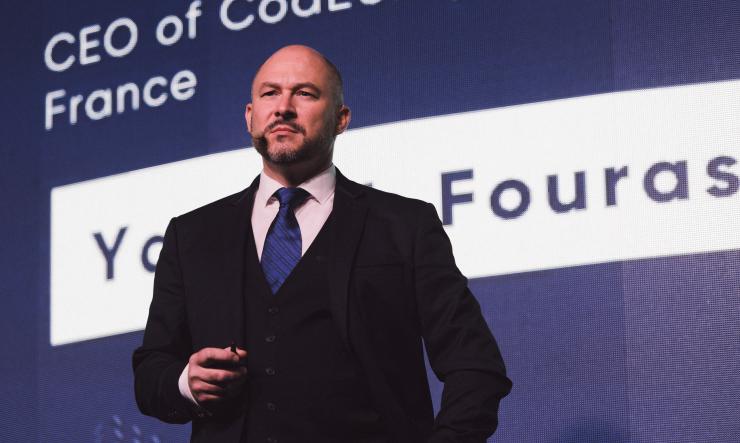
The impact of Industry 4.0 on economic growth is confirmed by international examples of digital transformation, said Yannick Fourastier, Digital Transformation Project Manager at Airbus and Bombardier.
He cited several examples of economic effects following the introduction of Industry 4.0: "McKinsey estimates that operating costs are reduced by 10-12%, productivity is increased by 7-12% and net profit is increased by 10-15%."
Mr. Fourastier also shed light on the relationship between transformation and customization.
"Let’s suppose you buy a yacht. And you can visit it before it is made using virtual reality. This is the first facet of Industry 4.0: experiencing the product. Next, you can join the development, as we do everything in virtual reality. And finally, technology makes it easy to print this yacht. Normally, it took 2 months to manufacture one. But now you place your order on Monday, in three days the hull is ready, the control panel and engine are put in on Saturday – and you can go fishing."
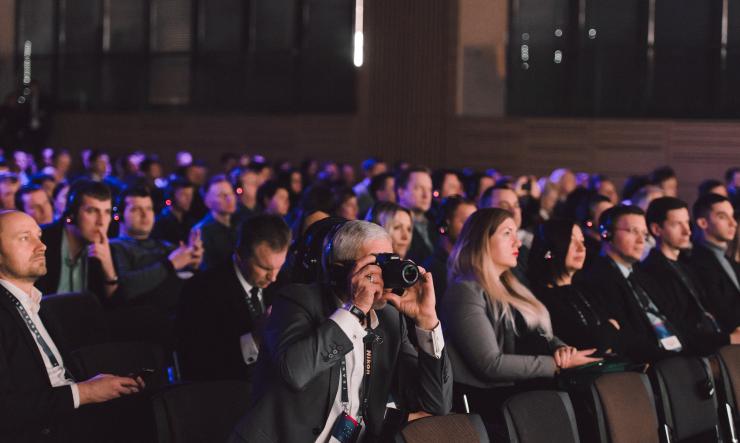
Another trending theme at the forum was AI, or artificial intelligence. This technology must belong to everyone, says Jan Peter de Jong, CEO at Microsoft Ukraine. He told the audience about a bot that answers students' questions in a chat (where their professor is also present), analyzes them, and distributes them immediately by topic. When preparing for a lecture, the professor can see which parts of the lectures raise most of the questions. This artificial intelligence was learning along with students, and such kind of technology should be available in all countries of the world, be safe and unbiased.
One of the brightest examples of significant changes in technology and business model is Netflix. "Over the last ten years, Netflix has changed its business model, not once or twice, but three times", - said Dominique Piotet, CEO at UNIT.City. He reminded the audience that Netflix started out as a "television killer" and was selling DVDs at that time.
"But who watches movies on DVDs now? So, Netflix changed the business model again and started to stream videos. And then, when they realized they were paying millions of dollars to Hollywood producers, Netflix decided to create their own videos. In 2019, the company plans to spend $6 billion on it. In three years, Netflix became the world's second-largest film producer, after Walt Disney. After all, if you do not change, you lose touch with your customers, you stop providing value to them and you will be overtaken by those who understand their needs", - Mr Piotet added.
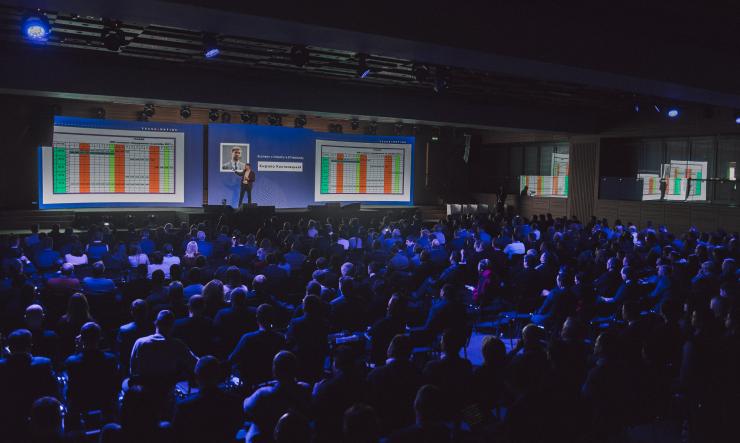
A successful Industry 4.0 case study was presented by Denis Morozov, a board member and CFO of Interpipe Group. In 2014, the company lost its main sales market and was forced to completely change its business processes and communication with customers.
"We needed to boost sales in Europe and the US and move from large and long-lasting orders to individual production, and this made us opt for a large-scale transformation", - said Denis Morozov.
According to the speaker, Industry 4.0 approaches and technologies – such as Digital Twin, SmartFactory, Predictive Maintenance, Artificial Intelligence, AR / VR, IIoT – increased the company's sales by 62% in Europe and 22% in the US. Energy costs for steel production were reduced by 45%, while the idle time of motor transport decreased by three times.
"Without Industry 4.0, competition in international markets is impossible", - Denis Morozov assured. Other case studies of Interpipe, one of the most innovative Ukrainian companies, prove the effectiveness of predictive maintenance and digital twins.
"There is a tool called the Industrial Internet of Things [IIoT – Ed.]. At one of the plants we installed 23,000 sensors, where 60 million events are processed daily. Based on this data, an AI can create a production plan. It takes a person several days, while a computer needs only 3 minutes", - said Dmitriy Shapovalov, CEO at Clobbi, a Ukrainian Industry 4.0 solutions provider. He also told how Digital Twin, SmartFactory, and AR/VR can have a positive effect on a company's financial performance.
SmartFactory is designed for making a digital copy of the enterprise by installing a network of sensors even for outdated equipment and integrating everything into a single system, which is controlled by artificial intelligence. This allows companies to increase their output and reduce scraps, and promotes the transition to predictive maintenance. Predictive maintenance, in turn, makes it possible to become as efficient as the leading companies with minimum investment.
"There are several approaches to deviations and accidents in production. The reactive approach is used when something has already happened. Scheduled maintenance helps only in 20% of cases. Diagnostic maintenance is used with airplanes at airports, i.e. checking many systems and subsystems before the take-off, which made 2017 the safest year in commercial aviation history. And the last approach is predictive maintenance", - explained Industry 4.0 Predictivity expert Kyrylo Kostanetskyi.
Mr. Kostanetskyi spoke about the economic effect of implementing predictive maintenance, machine learning and IIoT in Ukraine and the rest of the world. The introduction of such systems at Interpipe Steel has prevented 397 possible equipment breakdowns. Notably, the system warned back in February that a part of the gas purification system might break in June. This means that now it is possible not to keep the warehouses full of spare parts, but instead just buy them when needed.
"The company used to buy spare parts that were simply lying and then sold as dead stock or scrap. And the necessary parts had to be urgently ordered at any price. Today we know that there is a "yellow zone" in the system indicating what and when can fail. If I know that in 100 days something will stop working, I still have time to hold tender, buy spare parts and make repairs", - confirms Denis Morozov.
As the forum organizer, IT-Enterprise presented all of these technologies in the Transformation Zone. The IT-Enterprise stand showcased a real digital factory 4.0 (SmartFactory) with virtually all 4.0 technologies: Digital Twin, Predictive Maintenance, Machine Vision, Machine Learning, AR/VR, IIoT, BI, Artificial Intelligence, KPI Management and others. The visitors admitted how simply the integration of business processes and equipment through the Internet of Things was demonstrated.
The Transformation Zone also included demonstrations of robots from FANUC and Infocom. Interpipe showed VR technologies with a smart helmet, and SmartTender presented a model for predicting the odds of winning tenders. Its AI was created in collaboration with Microsoft Ukraine experts on the basis of Machine Learning and Big Data analysis principles.
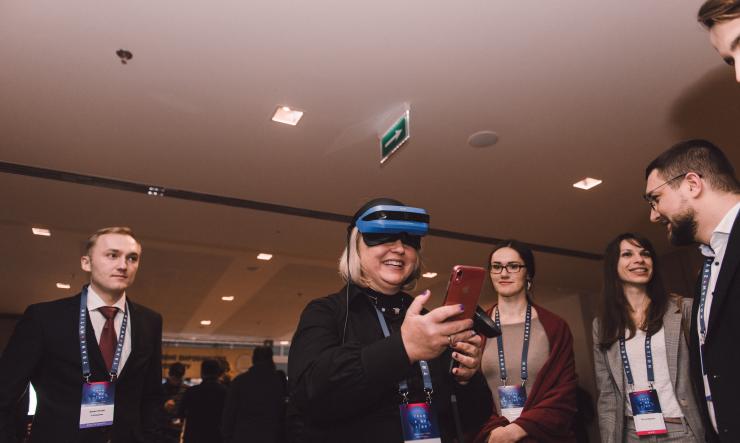
Full-scale transformation is also in progress at Ukrnafta oil company. "A single ERP system instead of a mixed bag of more than 48 individual systems gives us a huge synergy effect. We have the opportunity to save on human resources and unify all business processes that were standalone before", - reported Artur Kravets, Director of Ukrnafta Business Transformation Department.
Experts and practitioners at the Forum also discussed the role of the state in implementing digital transformation. "Industry 4.0 is not just about IoT or AI. It is about responding to global changes and forming a new culture of cooperation", - said Oleksandr Yurchak, CEO at the APPAU industrial association.
According to Mr Yurchak, there are 76 innovative companies in Ukraine, one-third of which work outside the country. To compare, there are 150 innovators in Israel focused on 9 major industries. "There are no target sectors for Industry 4.0 in Ukraine, no demand for such technologies or support with the state budget. But if industry players consolidate and express their requirements to the state, there may be some change in the situation", - added Oleksandr Yurchak.
The public sector is also actively using automation.
"Innovation for the state will consist in mutual data exchange, shared data processing and maximum non-interference of the human factor in these processes. For us, innovation is about managing data and making quick decisions", - Farid Safarov claimed. "For me, innovation is an opportunity to save time, which I cannot get enough of", - he added.
The need to transform the existing approaches and way of thinking, change the paradigm of process management and values is obvious to businesses and the state. Both sides are ready for dialogue and cooperation in order to synergize the opportunities and bring Ukraine to the level of European digital leaders. Domestic companies have already proven that they deserve to be in the first league. Change is worth acknowledging.